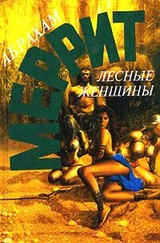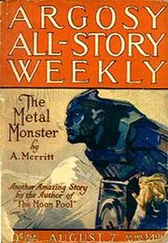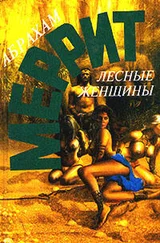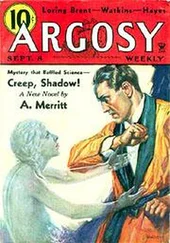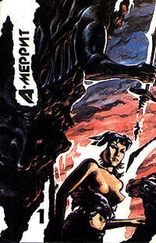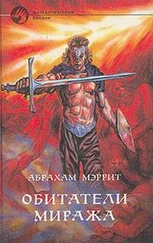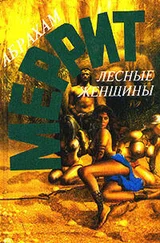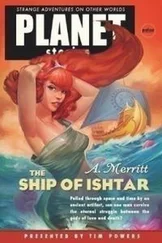We thrust forward against the living wave. It gave, curling round us.
On and on! Cut sword and hew axe! Cut and slash and batter through!
The curling wave that tore at us was beaten down. We were through the gap. Sirk lay before us.
I reined in my horse. Sirk lay before us—but too invitingly!
The city nestled in a hollow between sheer, unscalable black walls. The lip of the gap was higher than the roof of the houses. They began an arrow flight away. It was a fair city. There was no citadel nor forts; there were no temples nor palaces. Only houses of stone, perhaps a thousand of them, flat roofed, set wide apart, gardens around them, a wide street straying among them, tree–bordered. There were many lanes. Beyond the city fertile field upon field, and flowering orchards.
And no battle ranks arrayed against us. The way open.
Too open!
I caught the glint of arms on the housetops. There was the noise of axes above the blaring of trumpets and the roll of the kettle–drums.
Hai! They were barricading the wide street with their trees, preparing a hundred ambushes for us, expecting us to roll down in force.
Spreading the net in the sight of Dwayanu!
Yet they were good tactics. The best defence I had met with it in many a war against the barbarians. It meant we must fight for every step, with every house a fort, with arrows searching for us from every window and roof. They had a leader here in Sirk, to arrange such reception on such brief notice! I had respect for that leader, whoever he might be. He had picked the only possible way to victory—unless those against whom he fought knew the countermove.
And that, hard earned, I did know.
How long could this leader keep Sirk within its thousand forts? There, always, lay the danger in this defence. The overpowering impulse of a pierced city is to swarm out upon its invaders as ants and bees do from their hills and nests. Not often is there a leader strong enough to hold them back. If each house of Sirk could remain linked to the other, each ever an active part of the whole—then Sirk might be unconquerable. But how, when they began to be cut off, one by one? Isolated? The leader's will severed?
Hai! Then it is that despair creeps through every chink! They are drawn out by fury and despair as though by ropes. They pour out—to kill or to be killed. The cliff crumbles, stone by stone. The cake is eaten by the attackers, crumb by crumb.
I divided our soldiers, and sent the first part against Sirk in small squads, with orders to spread and to take advantage of all cover. They were to take the outer fringe of houses, at all costs, shooting their arrows up in the high curved flight against the defenders while others hammered their way into those houses. Still others were to attack farther on, but never getting too far from their comrades nor from the broad way running through the city.
I was casting a net over Sirk and did not want its meshes broken.
By now it was broad daylight.
The soldiers moved forward. I saw the arrows stream up and down, twisting among each other like serpents…I heard the axe–blows on the doors…By Luka! There floats a banner of Karak from one of the roofs! And another.
The hum of Sirk shot higher, became louder, in it a note of madness. Hai! I knew they could not long stand this nibbling! And I knew that sound! Soon it would rise to frenzy. Drone from that into despair!
Hai! Not long now before they came tumbling out…
Tibur was cursing at my elbow. I looked at Lur, and she was trembling. The soldiers were murmuring, straining at the leash, mad to join battle. I looked at their blue eyes, hard and cold; their faces beneath the helmet–caps were not those of women but of young warriors…those who sought in them for woman's mercy would have rude awakening!
"By Zarda! But the fight will be done before we can dip blade!" I laughed.
"Patience, Tibur! Patience is our strong weapon. Sirk's strongest—if they but knew it. Let them be first to lose that weapon."
The turmoil grew louder. At the head of the street appeared half a hundred of Karak's soldiers, struggling against more than equal number which steadily, swiftly, was swelled by others of Sirk pouring from side lanes and dropping from roofs and windows of the beleaguered houses.
It was the moment for which I had waited!
I gave the command. I raised the battle–cry. We drove down upon them. Our skirmishers opened to let us through, melting into the shouting ranks behind. We ripped into the defenders of Sirk. Down they went, but as they fell they fought, and many a saddle of the nobles was empty, and many were the steeds lost before we won to the first barricade.
Hai! But how they fought us there from behind the hastily felled trees—women and men and children hardly big enough to bend the bow or wield the knife!
Now the soldiers of Karak began to harry them from the sides; the soldiers of Karak shot into them from the tops of the houses they had abandoned; we fought Sirk as it had planned to fight us. And those who fought against us soon broke and fled, and we were over the barricade. Battling, we reached the heart of Sirk, a great and lovely square in which fountains played and flowers blossomed. The spray of the fountains was crimson and there were no flowers when we left that square.
We paid heavy toll there. Full half of the nobles were slain. A spear had struck my helmet and well–nigh dropped me. Bare–headed, blood–flecked I rode, shouting, sword dripping red. Naral and Dara both bore wounds, but still guarded my back. The Witch–woman, and the Smith and his scarred familiar fought on, untouched.
There was a thunder of hoofs. Down upon us swept a wave of horsemen. We raced toward them. We struck like two combers. Surged up. Mingled. Flash swords! Hammers smite! Axes cleave! Hai! But now it was hand–to–hand in the way I knew best and best loved!
We swirled in a mad whirlpool. I glanced at right and saw the Witch–woman had been separated from me. Tibur, too, was gone. Well, they were giving good account of themselves no doubt—wherever they were.
I swung to right and to left with my sword. In the front of those who fought us, over the caps of Karak which had swirled between us, was a dark face…a dark face whose black eyes looked steadily into mine—steadily…steadily. At the shoulder of that man was a slighter figure whose clear, brown eyes stared at me…steadily…steadily. In the black eyes was understanding and sorrow. The brown eyes were filled with hate.
Black eyes and brown eyes touched something deep and deep within me…They were rousing that something…calling to it…something that had been sleeping.
I heard my own voice shouting command to cease fighting, and at that shout abruptly all sound of battle close by was stilled. Sirk and Karak alike stood silent, amazed, staring at me. I thrust my horse through the press of bodies, looked deep into the black eyes.
And wondered why I had dropped my sword…why I stood thus…and why the sorrow in those eyes racked my heart…The dark–faced man spoke—two words—
"Leif!…Degataga!"
That something which had been asleep was wide awake, rushing up through me…rocking my brain…tearing at it…shaking every nerve…
I heard a cry—the voice of the Witch–woman.
A horse burst through the ring of the soldiers. Upon it was Rascha, lips drawn back over his teeth, cold eyes glaring into mine. His arm came up. His dagger gleamed, and was hidden in the back of the man who had called me—Degataga!
Had called me—
God—but I knew him!
Tsantawu! Jim!
The sleeping thing that had awakened was all awake…it had my brain…it was myself…Dwayanu forgotten!
I threw my horse forward.
Rascha's arm was up for second stroke—the brown–eyed rider was swinging at him with sword, and Jim was falling, settling over his horse's mane.
Читать дальше
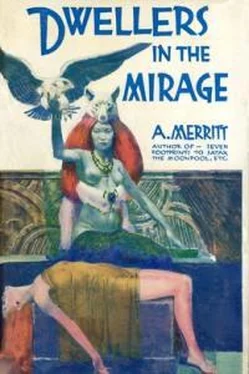
![Абрахам Меррит - Лунный бассейн [Лунная заводь]](/books/20623/abraham-merrit-lunnyj-bassejn-lunnaya-zavod-thumb.webp)
